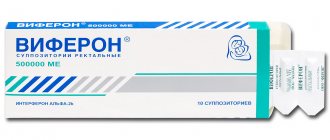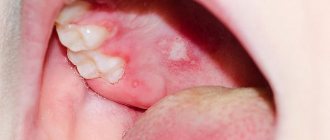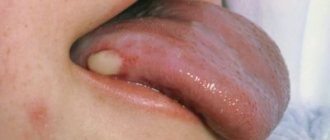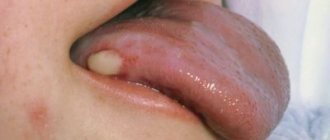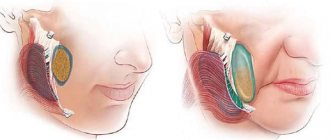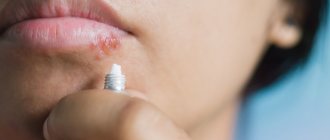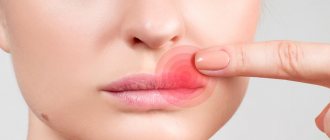Treatment of herpes in the mouth
Can herpes be in the mouth?
Maybe! Herpes in the mouth requires the same responsible approach and competent treatment as other diseases of the oral cavity. Despite the fact that the infection is often mild and goes away naturally, there are still risks of serious complications, and the possibility of infecting other people remains. Many factors influence the degree of development of the pathology and the presence of possible dangers for the patient. Complete diagnosis and comprehensive treatment can completely stop the manifestations of the infection, although complete elimination of the virus is considered impossible. Herpes, a viral disease known to many as a “cold sore,” is often perceived as a minor problem that does not require treatment. It is characterized by the appearance of a moderately painful blistering rash, but not many people know that this disease is not limited to appearing only on the lips , but can also develop on the oral mucosa . The disease is often accompanied by weakness, general malaise and severe itching, and in some cases can cause complications. During the active phase of the virus, a patient can easily infect others with it through household items, close contact or by airborne droplets.
2. Causes of stomatitis
We have already talked above about why irritation of the oral mucosa may begin. Now let's dwell on the question of why ulcers and herpes appear. Ulcers.
In fact, the exact causes of stomatitis in the form of ulcers are not known. But many things can contribute to their development. These include certain medications, oral injuries, poor diet, stress, bacteria and viruses, sudden weight loss and the consumption of certain foods - potatoes, citrus fruits, coffee, chocolate, cheese and nuts.
Stomatitis may be associated with a weakened immune system due to colds, flu, changes in the body's hormonal levels, as well as a lack of vitamin B12 and folic acid. Even accidentally biting the inside of your cheek or chewing on a sharp piece of food can cause an oral ulcer.
Ulcers can occur as a result of a genetic predisposition. In this case, it is considered an autoimmune disease. In general, ulcers appear in about 20% of people, but the disease is not contagious.
Visit our Therapy page
Symptoms of herpes on the oral mucosa
Symptoms of herpes are individual, have varying degrees of manifestation, and can occur in different parts of the oral cavity. For most cases, there are a number of signs that indicate the occurrence of herpes:
- Regular headache;
- Fever;
- A person gets tired quickly;
- Discomfort when eating and drinking;
- The appearance of water bubbles filled with transparent white or yellowish exudate, up to 3 mm in diameter;
- The appearance of ulcers at the site of burst blisters;
- Inflammation of the soft tissues of the oral cavity, redness, itching, burning, swelling of the lesion.
According to clinical studies, blisters in the mouth can form in different areas: on the palate, on the inside of the cheeks, on the tongue, on the gums, on the tonsils.
How to treat herpes on the gums
For herpes on the gums, dentists prescribe antiviral drugs. They speed up healing and stop the active spread of herpes. The drugs have contraindications, so be sure to consult your dentist before purchasing.
During the treatment period, it is recommended to include more dairy products in your diet, avoid hot and cold foods - food should be warm and soft, because solid food can damage the affected mucous membrane. You should also drink more fluids.
Stages of development of herpes in the oral cavity
The disease develops sequentially, including passing through several distinct stages:
- At first, the patient may experience drowsiness, malaise, and tingling or itching of the mucous membrane. Sometimes body temperature rises slightly;
- Next comes redness and swelling of the lesion, minor pain occurs due to the appearance of herpes on the tongue or lip;
- Blisters appear in the oral cavity, filled with transparent contents. During this period, the patient is most contagious, blood counts change;
- The blisters become cloudy and open, and yellowish, shallow, painful ulcers form in their place;
- A hard, fragmented crust forms on the ulcers, damage to which causes bleeding. After a few days, the crusts disappear.
In the best case, the disease resolves naturally within two weeks and without treatment. All wounds heal quickly and without scars.
But there are also complications that lead to infection of internal organs. Suppuration occurs at the site of the wounds, the temperature rises to 40 C. Inflammation of the lymph nodes in the jaw and neck may begin.
1.What is stomatitis, its types and symptoms
The term stomatitis refers to inflammatory processes in the oral cavity
that cause pain.
Stomatitis can cause discomfort and pain and interfere with eating, sleeping, and other daily activities. Canker sores can occur anywhere in the mouth, including the inside of the cheeks, gums, tongue, lips, and roof of the mouth
.
Types of stomatitis
There are several types of stomatitis, the main ones being:
- Ulcers
, also called aphthous ulcers. They usually appear in the mouth on the cheeks, tongue or lip, and appear as pale or yellowish sores with a red outer border; - Herpes
. Cold sores are fluid-filled sores that are located on or around the lips. Herpes on the gums and upper jaw also occurs, but very rarely. Herpes on the lips first looks like blisters filled with liquid, and then a crust or sore forms on it. Before a cold sore appears, there is often an itching, tingling or burning sensation on the lip. - Irritation of the oral mucosa
. It can be caused by biting the cheeks, tongue or lips, wearing braces, damage to the mucosa from a broken or sharp tooth, burns to the mouth from eating too hot food or liquids, gingivitis and other gum infections, and some autoimmune diseases. For example, systemic lupus, Crohn's disease or Behçet's disease. Mucosal irritation and stomatitis can be a side effect of treatment for other diseases - chemotherapy, antibiotics, drugs used to treat rheumatoid arthritis, epilepsy.
Symptoms of stomatitis
Symptoms of stomatitis depend on what type of stomatitis appears. So, mouth ulcer
usually painful and lasts 5 to 10 days. Often the ulcer appears again. And it is usually not associated with any colds.
Herpes
on the lip is not always painful. Rather, it causes discomfort. Herpes goes away in 7-10 days and its appearance is often a consequence of colds and flu.
A must read! Help with treatment and hospitalization!
Causes of oral herpes infection
Herpes that affects the oral cavity develops when infected with the herpes simplex virus type 1, which not only provokes the appearance of a blistering rash, but can also cause complications in 10% of cases. The second type of herpes virus (genital) also causes a rash in the mouth, but does not cause serious disruption to the body and differs in its mode of transmission (through sexual contact).
Most often, primary infection with a herpes virus occurs in childhood, after which it is introduced into the genome and remains in an inactive form for life.
The main routes of infection with a viral agent are close conversation, skin-to-skin contact, kissing, and the use of shared hygiene products or utensils. However, the entry of viral particles into the body does not guarantee that the disease will develop, since the immune system can suppress the action of the pathogen. In this case, situations that worsen the overall health of the body, on the contrary, provoke a clear manifestation of infection:
- surgical interventions;
- emotional and physical stress;
- lack of sleep, overwork;
- colds;
- chronic pathologies;
- long-term use of antibiotics;
- periods of menstruation, pregnancy or lactation;
- vitamin deficiencies;
- AIDS;
- abuse of nicotine or alcohol;
- the appearance of microtraumas from excessive exposure to the sun or frost.
Causes of herpes
Getting infected with herpes is easy. Kissing, sexual contact or using someone else's household appliances is enough. The virus can also be transmitted from mother to child through the placenta or during childbirth. As a rule, herpes does not appear immediately: a person may not know about its existence for years. However, under the influence of certain factors, herpes can awaken.
Causes of herpes on the gums:
- weakened immunity, colds;
- hypothermia;
- stress, overwork, lack of sleep;
- lack of hygiene;
- taking antibiotics;
- avitaminosis;
- teething;
- imbalance of microflora in the mouth.
Most often, herpes on the gums appears in the autumn-winter period, when the immune system is weakened and the body lacks vitamins.
Diagnosis and treatment of herpes infection
It is better to start treatment of herpes in the mouth at earlier stages of development to reduce the risk of complications and reduce the likelihood of infecting other people. In order to identify the disease, specialists carry out diagnostic measures:
- collect anamnesis;
- conduct an examination, determine the location of the rash and its nature;
- take a smear to identify the herpes virus and determine its type;
- laboratory tests are prescribed.
Modern methods for identifying the pathogen are a patient’s blood test to detect antibodies to the pathogen and a PCR study of tissues aimed at searching for the DNA of the viral particle. Differential diagnosis is of great importance, since herpetic infection must be distinguished from other similar diseases: stomatitis (not herpetic), tonsillitis, etc.
How to treat herpes on the lip, tongue or gum? Herpes therapy is based on an integrated approach that combines:
- The use of local antiviral agents to stop the process of reproduction and spread of the pathogen;
- Prescribing antiviral medications for internal use (usually indicated for those whose symptoms occur frequently and acutely, or who are immunosuppressed);
- The use of antiseptic drugs for treating blisters and ulcers, rinsing;
- Use of topical anesthetic gels;
- Prescribing non-steroidal anti-inflammatory drugs to alleviate general well-being;
- Strengthening the immune system by taking vitamins and immunomodulators.
To eliminate symptoms, advanced technologies such as laser radiation are also used. The technique allows you to quickly and painlessly destroy viral particles without harming mucosal cells and effectively healing damaged tissue. In most cases, several short procedures are sufficient for complete disappearance of symptoms in 2-4 days.
4. Treatment of stomatitis
Stomatitis is treated by dentists.
In general, mouth ulcers usually go away in no longer than two weeks, even without treatment. If the causes of the ulcer are established, the doctor will be able to choose the appropriate treatment. If they are not known, the main therapy will be aimed at alleviating the symptoms of the disease.
The following measures can help relieve pain and inflammation in the mouth:
- You should avoid hot drinks and foods, as well as salty, hot, spicy foods and citrus fruits;
- For severe pain, you can take painkillers;
- Rinsing your mouth with cool water or a small amount of ice can help relieve the burning sensation in your mouth.
To treat an ulcer, which is aimed at eliminating discomfort and protecting against infection, your doctor may recommend drinking more water and rinsing your mouth with salt water. Local anesthesia (such as lidocaine) may relieve pain. But this method for treating stomatitis in children is not recommended. A mixture of hydrogen peroxide and water in a 1:1 ratio or regular baking soda and water can be applied pointwise to the ulcer area. In addition, dentists may prescribe pain-relieving medications and corticosteroid pastes that can protect the affected areas on the lips and gums. Anti-inflammatory pastes, gels and rinses treat ulcers quite effectively and help reduce swelling and pain. They are also effective for severe cases of herpes on days 3-4, when the virus has disappeared but inflammation remains.
In any case, you should consult your doctor before taking medications, as some medications have side effects and are not recommended for people with diabetes and other diseases.
Treatment of herpes
There is no cure for herpes as such. We can only recommend lubricating the area of inflammation with special ointments (usually they contain acyclovir) and applying ice.
Sometimes doctors prescribe antiviral pills for herpes. Some experts believe that they can shorten the healing time of cold sores.
Stomatitis is usually not particularly dangerous, but not all ulcers are harmless. In any case, if stomatitis, inflammation and ulcers do not go away within two weeks, you should definitely consult a doctor.

